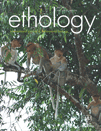
ETHOLOGY
Scope & Guideline
Exploring the Depths of Animal Behavior Research
Introduction
Aims and Scopes
- Behavioral Mechanisms and Ecology:
Research articles often explore the mechanisms underlying animal behavior in natural contexts, emphasizing how ecological factors influence behavior, adaptation, and survival. - Social Behavior and Interactions:
The journal frequently publishes studies on social dynamics, including cooperation, competition, and communication among individuals within and across species. - Cognitive and Learning Processes:
A core focus is on cognitive ethology, examining how animals learn, remember, and make decisions based on environmental cues and social interactions. - Physiological and Genetic Influences:
Research often investigates the physiological and genetic bases of behavior, linking behavioral traits to hormonal, neurological, and genetic factors. - Impact of Environmental Changes:
There is a growing interest in how environmental changes, such as urbanization and climate change, affect animal behavior and ecology.
Trending and Emerging
- Reciprocal Altruism and Cooperation:
Recent publications emphasize the mechanisms and evolutionary significance of altruism and cooperation among animals, particularly in social species, highlighting their implications for understanding social evolution. - Impact of Anthropogenic Factors:
There is an increasing focus on how human activities, such as urbanization and pollution, influence animal behavior and ecological interactions, reflecting a broader concern for conservation and environmental sustainability. - Interdisciplinary Approaches to Behavior:
Emerging themes include the integration of technology in behavioral research, such as the use of machine learning and automated data collection methods, leading to innovative ways of studying animal behavior. - Personality and Individual Differences:
A growing body of research is dedicated to exploring personality traits in animals, examining how individual differences affect behavior, social interactions, and fitness. - Learning and Cognitive Flexibility:
There is a trend towards investigating cognitive processes in animals, including learning strategies and adaptability to changing environments, which are critical for understanding behavior in the face of rapid ecological changes.
Declining or Waning
- Traditional Behavioral Studies:
There appears to be a waning interest in purely observational studies of behavior without ecological or evolutionary context, as researchers increasingly seek to integrate behavioral studies with broader ecological and genetic frameworks. - Behavioral Studies in Captivity:
Research focused solely on captive animal behavior is less prevalent, likely due to a shift towards understanding behavior in naturalistic settings or in response to environmental changes. - Descriptive Ethology:
There has been a noticeable decline in purely descriptive studies of animal behavior, with a growing preference for studies that include hypothesis testing and mechanistic exploration.
Similar Journals

GENES BRAIN AND BEHAVIOR
Illuminating the Genetic Basis of Brain Function and BehaviorGENES BRAIN AND BEHAVIOR is a leading journal published by Wiley that focuses on the intricate interplay between genetic factors and behavioral neuroscience. With a robust ISSN of 1601-1848 and an E-ISSN of 1601-183X, this journal serves as a premier platform for innovative research that spans across multiple fields including genetics, neurology, and behavioral neuroscience. Recognized for its significant impact with a 2023 categorization of Q1 in Behavioral Neuroscience and Q2 in both Genetics and Neurology, GENES BRAIN AND BEHAVIOR asserts itself as an influential resource for scholars, practitioners, and students alike, facilitating the advancement of knowledge in these dynamic areas. Its Scopus rankings underscore its prominence—ranking #18 in Behavioral Neuroscience and #45 in Neurology, placing it in the top percentiles among its peers. Although not an open-access journal, the rigorous peer-review process ensures high-quality publications, pivotal for those pursuing cutting-edge research and applications. With a history of convergence from 2002 to 2024, this journal continues to foster academic dialogue and discovery in the ever-evolving landscape of brain and behavioral studies.

ANIMAL BIOLOGY
Unveiling the Wonders of BiodiversityANIMAL BIOLOGY is a distinguished journal published by BRILL, focusing on the dynamic fields of Animal Science and Zoology, as well as Ecology, Evolution, Behavior, and Systematics. With an ISSN of 1570-7555 and an E-ISSN of 1570-7563, this quarterly journal serves as a pivotal platform for researchers and professionals seeking to contribute to the understanding of animal biology across diverse ecological contexts. The journal is recognized with a 2023 Scopus ranking of #234 out of 490 in the Animal Science and Zoology category, placing it within the 52nd percentile, alongside a rank of #409 out of 721 in Ecology, marking a solid contribution to the field. Although it currently holds a Q3 quartile in both categories, its commitment to quality research and novel insights continues to bolster its significance within the academic community. The open access option coupled with its publication history from 2003 to 2024 ensures a wide dissemination of knowledge, drawing in a global audience of researchers, professionals, and students eager to explore the intricacies of animal biology. By promoting high-quality discussions and innovative studies, ANIMAL BIOLOGY plays an essential role in advancing the understanding of life sciences and the evolution of biodiversity.

BEHAVIOUR
Pioneering Research in Behavioral InsightsBEHAVIOUR, published by BRILL, is a distinguished academic journal that serves as a pivotal platform for research in the fields of Animal Science and Behavioral Neuroscience. With a legacy dating back to 1948, this journal has been a cornerstone for scholars and practitioners seeking to explore the complexities of animal behavior, offering insights that are vital for both academic inquiry and practical application. The journal, which has an ISSN of 0005-7959 and E-ISSN of 1568-539X, is characterized by its rigorous peer-review process and commitment to disseminating high-quality research. Currently, BEHAVIOUR holds a Q2 ranking in Animal Science and Zoology and a Q4 ranking in Behavioral Neuroscience for 2023, indicating its respectable standing in the academic community. Researchers and students alike can access the journal through institutional subscriptions, and while it does not offer Open Access options, its importance in fostering understanding of behavioral patterns across species is indisputable. This journal continues to be an essential resource for those looking to deepen their knowledge and contribute to the evolving discourse in animal behavior.
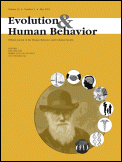
EVOLUTION AND HUMAN BEHAVIOR
Exploring the Interplay of Evolution and Human ActionEVOLUTION AND HUMAN BEHAVIOR, published by Elsevier Science Inc, is a leading interdisciplinary journal that explores the intricate relationships between evolutionary processes, human behavior, and cognition. With an impressive impact factor reflecting its rigorous peer-reviewed content and high citation rates, this journal falls in the prestigious Q1 quartile across multiple categories including Arts and Humanities, Ecology, Evolution, Behavior and Systematics, and Experimental and Cognitive Psychology, solidifying its critical role in advancing research in these fields. Since its inception in 1997 and moving towards 2024, it has consistently provided a platform for innovative research and insights, attracting contributions from a diverse range of disciplines. The journal is accessible through various open access options, ensuring that groundbreaking research is widely disseminated for maximum impact. Researchers, professionals, and students alike benefit from the cutting-edge studies published within, making EVOLUTION AND HUMAN BEHAVIOR an essential resource for those looking to deepen their understanding of the evolutionary context of human actions and interactions.
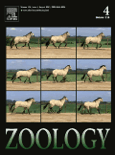
ZOOLOGY
Exploring innovative insights in zoology.ZOOLOGY, an esteemed journal published by Elsevier GmbH, stands at the forefront of research in the Animal Science and Zoology fields. With a notable impact factor and recognized as a Q1 category journal in its discipline, ZOOLOGY is highly regarded among researchers, ranking #98 out of 490 in Scopus rankings. Founded in 1994 and continuing through to 2024, the journal aims to publish cutting-edge, peer-reviewed articles that contribute significantly to the understanding of zoological sciences. Based in Munich, Germany, ZOOLOGY provides both subscription and open access options, ensuring that influential research reaches a wider audience. It serves as an essential platform for disseminating innovative findings, connecting scholars globally, and fostering interdisciplinary collaboration to advance zoological knowledge.

ZOOLOGICAL SCIENCE
Cultivating Knowledge for a Sustainable FutureZoological Science, published by the Zoological Society of Japan, is a leading journal dedicated to the fields of animal science and zoology. With its ISSN 0289-0003, this respected publication has established itself as a prominent source of scientific research, attaining a commendable Q2 ranking in the 2023 category of Animal Science and Zoology. Spanning over three decades, from 1992 to 2024, the journal offers a valuable platform for scholarly articles that explore various aspects of zoology, including ecology, behavior, and evolutionary biology. Although it operates under a traditional subscription model, its contributions are supported by a robust community of researchers and professionals who value its insights. The journal strives to foster academic discourse and insights that drive understanding and conservation of wildlife, making it an essential resource for students and established experts alike. The publishing headquarters located in Tokyo, Japan, further enhances its international reach and influence in zoological studies.

JOURNAL OF COMPARATIVE PSYCHOLOGY
Fostering Innovation in Behavioral ResearchJOURNAL OF COMPARATIVE PSYCHOLOGY is a prestigious academic journal published by the American Psychological Association, dedicated to advancing the understanding of behavioral processes across diverse species. With its ISSN 0735-7036 and E-ISSN 1939-2087, the journal has been a cornerstone of comparative psychology research since its inception in 1983. It primarily caters to the fields of ecology, evolution, and behavior, ranking impressively in the Q2 quartile in the category of Ecology, Evolution, Behavior and Systematics, and Q3 in the miscellaneous Psychology category as of 2023. This journal serves as a vital platform for disseminating high-quality research, addressing both fundamental questions and applied issues in systematic studies of behavior across species. Although not open access, its rich repository of research articles, meta-analyses, and reviews makes it an indispensable resource for researchers, practitioners, and students striving to deepen their knowledge and foster innovation in comparative psychological studies. With a commitment to rigorous peer review and scholarly excellence, the JOURNAL OF COMPARATIVE PSYCHOLOGY is a key player in shaping the discourse within its field and driving future research.

JOURNAL OF ETHOLOGY
Bridging Research and Conservation in Animal ScienceJournal of Ethology, published by Springer Japan KK, is a prominent academic journal that focuses on the study of animal behavior and ecology. With an ISSN of 0289-0771 and an E-ISSN of 1439-5444, this journal serves as a critical platform for researchers, professionals, and students interested in the intricate dynamics of animal behavior and its ecological implications. The journal is recognized for its contributions to the fields of Animal Science and Zoology, and Ecology, Evolution, Behavior and Systematics, achieving a respectable Q3 quartile ranking in both categories as of 2023. Although it is not an open access journal, it offers extensive research articles and reviews, bridging theoretical and practical aspects of ethology. Spanning an extensive publishing history from 1983 to 2024, the Journal of Ethology aims to disseminate high-quality research that enhances our understanding of animal behavior, fostering interdisciplinary connections and advancing knowledge in animal welfare, conservation, and behavioral ecology.
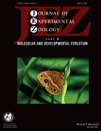
JOURNAL OF EXPERIMENTAL ZOOLOGY PART B-MOLECULAR AND DEVELOPMENTAL EVOLUTION
Connecting disciplines to foster evolutionary breakthroughs.JOURNAL OF EXPERIMENTAL ZOOLOGY PART B-MOLECULAR AND DEVELOPMENTAL EVOLUTION, published by Wiley, is at the forefront of research in the fields of molecular biology, developmental biology, and evolutionary science. With an impressive impact factor reflective of its significance, this journal maintains a prominent position in the academic landscape, evidenced by its Q1 ranking in Animal Science and Zoology, as well as Ecology, Evolution, Behavior and Systematics for 2023. It rigorously publishes innovative research spanning a wide array of topics pertinent to molecular and developmental evolution, making it an invaluable resource for researchers, professionals, and students alike. This journal not only offers Open Access options, enhancing the visibility of groundbreaking findings, but also supports interdisciplinary collaboration by integrating insights from genetics and molecular medicine. With a commitment to advancing knowledge, the journal is poised to contribute significantly to our understanding of biological processes and evolutionary dynamics through its convergence of research from 2003 to 2024.
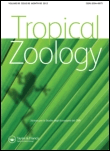
TROPICAL ZOOLOGY
Connecting researchers to the heart of tropical ecology.TROPICAL ZOOLOGY is a prestigious academic journal dedicated to advancing knowledge and research in the fields of animal science, zoology, and ecology. Published by PAGEPRESS PUBL, this journal has been an integral part of the scientific community since its inception in 1988, providing a platform for the dissemination of innovative research and discoveries related to tropical wildlife and ecosystems. With an impact factor placing it in the Q3 category for both Animal Science and Zoology, as well as Ecology, Evolution, Behavior, and Systematics, it ranks among the noteworthy publications in these fields. Researchers, professionals, and students will find that TROPICAL ZOOLOGY is an essential resource for the latest findings, fostering a deeper understanding of biodiversity and conservation in tropical environments. The journal is based in the United Kingdom, with additional administrative support from MEDIGROUP in Italy, ensuring a broad international perspective and reach. While it does not operate under an open access model, it remains committed to high-quality peer-reviewed content that contributes significantly to the understanding of tropical ecosystems and the species that inhabit them.